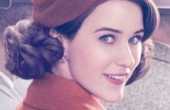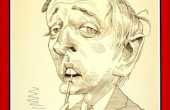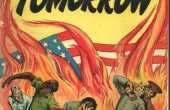Joseph Cernik
Editor, Missouri Policy Journal. Writer on Substack (American Eclectic).
Correspondent II
- Plebian Penman
- Common Writer
- Aristocratic Author
- Lurker
- Pssst
- Hand Raiser
- Vocal
- Outspoken
- Extrovert
- Center of Attention
- Forms a Crowd
- Sharp-Eyed Citizen
- Town Watch
- Detective Deskman
- Penman Patrol
- Motivational Columnist
- Actor
- Successful Pilot
- Well Read
- Article of the Month
- ?
- Articles
14 - Featured
14 - Comments
926
- Ext. Comments
385 - Processed
110 - Revisions
102
- Topics
29 - Topics Taken
1 - Notes
152
- Topics Proc.
33 - Topics Rev.
10
- Points
5806 - Rank
9 - Score
4719
Latest Articles
Latest Topics
Star Trek's Interconnected HistoryFor someone choosing to write an essay on this topic, the issue of interconnected history, binding the seven Star Trek TV shows (the Original, The Next Generation, Deep Space Nine, Voyager, Enterprise, Discovery, Picard) together, presents an interesting way of discussing a narrative that connects the shows and keeps interest in previous Star Trek series alive. |
Science Explained Through Television: From Watching Mr. Wizard to Bill Nye the Science GuyFrom Don Herbert who starred in “Watch Mr. Wizard” (1951—1965) to Bill Nye who starred in “Bill Nye the Science Guy” (1993-1998), we see that science could be explained in ways which do require a degree in science. How do we look at the impact of these shows? Both Herbert and Nye have had some degree of prominence beyond their shows. In the case of Herbert, by the mid 1950s, there were several thousand Mr. Wizard science clubs, and, in the case of Nye, besides appearances on TV shows such as “The Big Bang,” and “Dancing with the Stars,” Nye has been prominent in addressing creationism and global warming. The legacy of these two individuals can be studied to address making science a topic that is not simply left to scientists. |
How Widows are Seen and Portrayed in America through MoviesThis is an outgrowth of a few comments I noticed on my article about The Marvelous Mrs. Maisel–the issue of widows was raised. It might be interesting to see how widows have been presented in movies, say, a movie from each decade from the 1950s to the present (or beginning before the 1950s). Movies can reflect the values and norms of a period in time so what changes are seen and how do they reflect changing values? A 1947 movie, The Ghost and Mrs. Muir, starred Gene Tierney (as a widow) and Tex Harrison (as the ghost). Or, the 2018 movie, Widows, starring Viola Davis and Michelle Rodriguez. What impact did and do these movies have on how the public looks upon widows? |
Published | Harry Potter: Reading versus The MoviesCharacter development, something that movies do not have the time for, but books do, allows for the creation of a more complex environment. In the case of the Harry Potter books, it was possible to develop an appreciation of the difficulties of learning magic and of the slow process of social interaction among a wide cast of characters. As a result, as one works their way through the books, characters develop more substance. What gets lost, glossed over, or just mentioned in passing in the movies, can be understood and appreciated when watched after having read the books. An essay can focus on the contrasts between understanding Harry Potter from the books versus watching the movies, without having read the books. This can be useful as a way of highlighting the importance of reading but also the difficulties of writing for the big screen.
|
Animation and Political Satire"Pinky and the Brain" and "Rocky and Bullwinkle" were two series that often contained subtle and, at times, not so subtle jabs at politics. An example is an episode of "Pinky and the Brain" where the Brain found a Rush Limbaugh record where Limbaugh sings and the Brain is going to use it to "try to takeover the world." There may be other series that can be added to this essay, these are included here as examples. The broader theme is that political satire can be found weaving itself through several animation series. An essay can address the writers and what they said. In addition, did viewers pick up on the satire? Did the satire reach beyond the viewers? So, several issues, perhaps others, can be addressed in a well-developed essay.
|
"American Pickers" and Reality TV: The Real from the Staged“American Pickers” on the History Channel is fun and enjoyable to watch. The problem, however, is how real is it actually. Reality TV shows need to keep the audience entertained and want them to come back for more, this show is no different. By focusing on this specific show an essay can address staged from real and the impact the show might have on people who begin to believe the stuff they have in a garage, a storage bin, a loft (probably junk they long forgot about) is worth anything of real value. In the case of this show watching people call their stuff “collecting” when it looks more like hoarding can contribute to a good essay.
|
Binge-Watching and TV Criticism“Happy Valley” (Season 3), “Stranger Things” (season 3), “Lost in Space” (Season 2), “Queen of the South” (Season 3), or “Into the Badlands” (Season 3). There are other series out there. Sure, some come from the BBC or AMC, but the convenience of quickly seeing as many episodes as one can enjoy in a short period of time, is so different than watching “Davy Crockett” on “Walt Disney’s Wonderful World of Color,” spread out over three Sunday evenings, eventually getting to Davy dying at the Alamo.
|
Hopalong Cassidy and Sky King save the Day: A Time when Saturday Morning TV MatteredThis topic requires a look back at the early days of TV, which might not seem to matter but still has an influence. TV, at one time, was an experiment and it might end up being a surprise that certain shows became popular and had a following. Looking at the early days of children's shows and how they contrast with the present provides an insight into how far TV has come–not necessarily always for the better, just a reflection on how far we have come. Contrasts or evolution or maybe it is just development are a way to measure change: What is different about the present and whether it is better or just different from the past is useful. An historical perspective is a good way to look at the present. In this situation, looking at children's TV shows can provide that perspective. Change should not always be seen as an improvement, sometimes it is just change–we do things different than they were done in the past just not necessarily better, just different. |
Latest Comments
| Should Modern Newspapers Publish Poetry? | |
I suppose for years to come there will commentaries or analysis on 1984. Orwell just seems to be one of those writers who every few years sparks the imagination of all who read his book. It is interesting to read different perspectives on this book. You made some good points. | 1984: What Does it Tell us About The Purpose of Life? |
A good essay on what I thought after seeing it was a thoughtful movie. Not really a blockbuster, but a movie that did force you to think about life as it moves along. | Click: A Tragic Tale Exploring the Importance of Family |
A good essay. Usually, scenarios that try to think through how a nuclear weapon might be used, focus on a limited use of nuclear weapons. Movies tend to create the impression of everything going off at once, which, I think, creates the wrong impression of what could possibly happen. The case of Nagasaki and Hiroshima, these came in the Second World War several years after the United States entered the war. The firing bombings of Tokyo which killed 80,000–100,000 people were five months before Hiroshima was bombed. If the atomic bomb had been developed earlier would the United States have used it in, say, 1942. War, as in the case of the Second World War, escalated as the war proceeded. Nagasaki and Hiroshima I think create a wrong historical illustration for how a future nuclear weapon might be used. | Nuclear Nightmares in Film and Preventing Eventual Armageddon |
A good essay on a movie I thought was not particularly good. I guess Capitalism addressed in the movie is there, I thought it was about the character of a man. Capitalism, or a version of it, was the setting to portray a character. | Alienation in "There will be Blood" |
Thanks. I might need to write a follow-up essay with Trump back in the Presidential race (assuming he gets the Republican nomination). | The Donald Show: Trump, Television, and Manufactured Reality |
A good, well written article. I am aware that movies cannot possibly address the complexity of how a first nuclear-use situation might occur (in this post Second World War era). The use of a nuclear bomb in a Pakistan-Indian exchange is a possibility. In addition, in movies, nuclear missiles are always shown working the way they are intended. There is a term Circular Error Possibility (CEP) which addresses determining the accuracy of nuclear missiles. Generally speaking, this term addresses some of those missiles not functioning as intended but perhaps a missile shot from a silo in North Dakota hitting New York City. I have watched a number of these movies, and it is what I realize is missing that I wish was included in them. | Nuclear Nightmares in Film and Preventing Eventual Armageddon |
A good article. While I enjoyed the discussion of different movies, the range of them from The Seventh Seal to Jaws led me to wonder what is limited to being “international.” | When Art House Was King: The Golden Age of International Cinema |






Interesting article. I’m not sure newspaper readership would necessarily increase but poems could add a different dimension to reading a newspaper. Furthermore, the types of poems would become an issue, Alan Ginsberg versus Henry Wadsworth Longfellow.